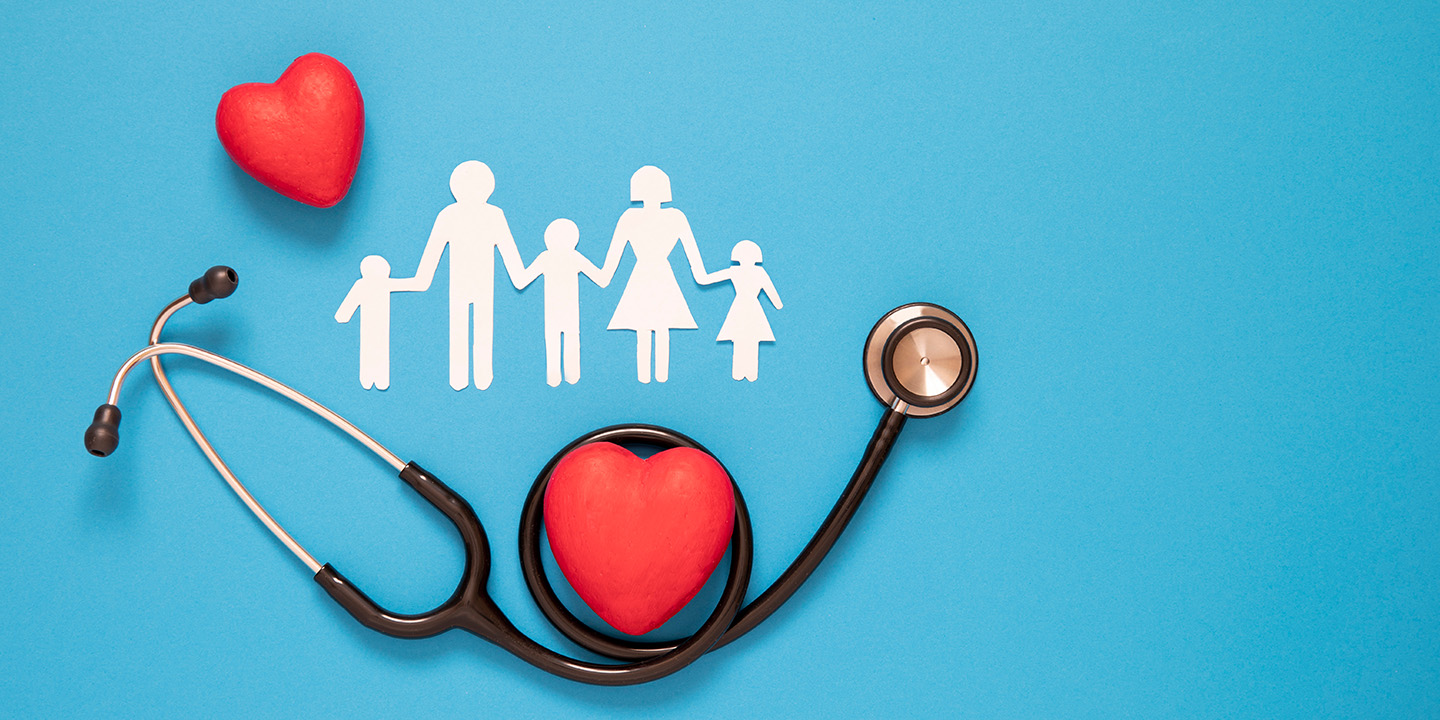Secure your health with comprehensive insurance plans from Nivabupa
Tell us a bit about you
PCOS and PCOD: Everything You Must Know About It

Before we define what PCOS and PCOD are, it’s important to understand the parts that they primarily affect. A woman’s reproductive system comprises two ovaries that alternately release an egg every month. If the egg is fertilised with the sperm, the first step towards pregnancy is taken. Otherwise, the egg is eliminated during the monthly periods. The ovaries are also responsible for secreting hormones like oestrogen, and progesterone, which regulate fertility, menstruation, and the development of hair. And it releases androgens (commonly thought of as male sex hormones) in minute quantities.
What is PCOS?
Polycystic ovary syndrome (PCOS) is a metabolic condition that impacts the entire endocrine system of women. The endocrine system is a collection of key glands and organs that handle hormone production and regulation in the body. These hormones control nearly all the processes in your body, such as growth, emotions, sexual functions, and even sleep.
In PCOS, the ovaries are enlarged and are distinguished by elevated androgen levels, the presence of small cysts in one or both ovaries, and irregular periods. The underlying cause of PCOS is still unknown, but genetics and environmental factors play a vital role in its development.
Women with PCOS or PCOD have higher insulin resistance. The ovaries respond to the excess insulin in the system by producing androgens, which can then lead to anovulation – a condition when the egg is not released. As a disorder that affects the hormonal balance in the system, specifically the reproductive function, PCOS causes women to stick to healthier life choices to manage symptoms.
What is PCOD?
Often used interchangeably, polycystic ovary disease results from an imbalance in hormones. The ovaries tend to release multiple eggs, either immature or partially mature, which develop into cysts over time. These cysts release androgens – the male sex hormones, creating further health complications. PCOD disrupts daily living since you can't get away with doing activities that are hazardous to your health.
Common PCOS/PCOD Symptoms
1. Sadness and Depression
About 40% of women with PCOS experience depression, particularly adolescent girls. This is partly due to younger women being more concerned about their physiology. As PCOS impacts hair growth – increase in body hair, and decrease in head hair, it can cause concern amongst younger women. Mental health also goes undiagnosed for many reasons, like lack of access to quality mental healthcare, social stigma, and lack of awareness, and this results in its own set of health issues.
2. Weight Gain
PCOS is linked heavily with insulin resistance. Insulin is vital in regulating sugar levels in the bloodstream. With increased resistance to insulin, the body stores extra sugar as fat, which causes weight gain. Obesity is also a risk factor for the development of PCOS, making it both the cause and effect of PCOS. In addition, affected women are also at risk of developing diabetes.
3. Infertility
It's challenging to get pregnant with PCOS, since the ovulation stage is often skipped due to the imbalance in hormones. If you do not ovulate, you will not get pregnant. There’s also a high chance of miscarriage with PCOS, given the imbalance in hormones, blood sugar, and pressure.
4. Metabolic Syndrome
Women with PCOS are at high risk for metabolic syndromes like obesity, hypertension, insulin, and resistance. These are other causes of cardiovascular disease, type 2 diabetes, cancer, and sleep apnoea.
5. Endometrial Cancer
Due to prolonged exposure of the endometrium to oestrogen from anovulation, there is a 2.7-fold increase in developing endometrial cancer. There may also be an increased risk for ovarian cancer in women with PCOS.
While there is no cure, there are PCOS treatments to help manage the symptoms.
How Can I Manage my PCOS Symptoms?
Lifestyle Changes
This includes following a healthy diet with lean protein, low fat, low glycaemic index foods such as whole grains, leafy greens, fruits, and lentils. Cut out simple carbohydrates, alcohol, and smoking. Lose weight by exercising regularly and achieve your ideal Body Mass Index (BMI). Healthy eating, daily exercise, and avoiding harmful substances can bring substantial relief.
Medicines
Oral contraceptive pills have proven to reduce the risk of endometrial cancer, while also inducing regular periods. Medicines are also available for different stages of pregnancy to regulate key hormones. Whereas creams, electrolysis, and laser treatments are available for excessive hair growth and hair loss.
Surgery
Laparoscopic ovarian drilling is an invasive option that destroys androgen-producing tissue, correcting hormonal imbalance and restoring the normal functioning of the ovaries.
Insurance
PCOS is a common hormone problem in women of child-bearing age. And while there’s no cure, most symptoms can be managed with lifestyle changes, and one can lead a normal life, including bearing children. However, it is a serious condition that can lead to health complications later in life, which is why it is recommended to obtain a women's health insurance policy that also includes maternity insurance.
The Niva Bupa Health Pulse plan offers critical illness insurance protection, including support for pre-existing conditions, and treatment for PCOS-related complications. With PCOS, you may have to visit the hospital several times, for which your health insurance benefits can come in handy. The value of health insurance cannot be emphasised, since it covers pre and post hospitalisation fees, as well as yearly health check-ups.
Popular Searches : Health Insurance Company | Health Insurance | Health Insurance Articles | Critical Illness Insurance | Personal Accident Insurance | Mediclaim Policy | Individual Health Insurance | Family Health Insurance | GoActive Family Floater Plan | Health Companion Family Floater Plan | Health Premia Family Floater Plan | Health Pulse Family Floater Plan | Health Recharge Family Floater Plan | Heartbeat Family Floater Plan | Money Saver Family Floater Plan | Saral Suraksha Bima Family Floater Plan | Senior Citizen Family Floater Plan | Super Saver Family Floater Plan | Corona Kavach Family Floater Plan | Mediclaim | Hospital Cash Insurance | Cashless Health Insurance | Maternity Insurance Benefit | Travel Insurance
Covid : Omicron | Coronavirus Health Insurance | Covid XE Variant | Norovirus
Health Insurance Schemes : Chief Ministers Comprehensive Health Insurance Scheme | Employee State Insurance Scheme
Others : Health Card | 80d Tax Saving | Ayushman Bharat
Secure your health with comprehensive insurance plans from Nivabupa
Tell us a bit about you

Niva Bupa policy Renewal- Renewing health insurance policy is very important if you want to have a continue protection against medical emergency. Follow Steps for Niva Bupa Policy Renewal process.
READ MORE
One of the crucial roles of the family is to maintain good health and prevent illness. So get the family health insurance plan today to secure your family’s future.
READ MORE
Learn 15 Easy Free Hand Exercises with Benefits and try them at home. These exersices will help you have a flexible and a healthy body
READ MORE
Preventive health check-ups are medical examinations performed to assess your overall health. Understand the importance of preventive health check-ups, how to buy preventive health check-ups, etc. Read to know more.
READ MORE
Explore the benefits of corporate health insurance for employees and the advantages of personal health insurance for individuals. Make an informed decision about which insurance type is better suited to your needs, ensuring comprehensive health coverage with Niva Bupa's expert guidance.
READ MORE
Apart from birth defects and injuries, the most common causes of blindness and vision impairment are age-related eye diseases. Blindness could be temporary or permanent.
READ MORE
Heart block treatment is little expensive, so to save your money Niva bupa offers affordable health insurance plans for heart patients. Read the article & know about home remedies to cure heart block.
READ MORE
Chosing running as a hobby is the best way to stay healthy and fit. Read the top 10 reseasons why you should take up running as a hobby in this article to get a deep knowledge.
READ MORE
A health card works as a token of assurance that your health risks are covered. Have an insight about health card details, benefits of health card and how does a health card work. Read to know more.
READ MORE
Pradhan Manti Jan Arogya Yojana scheme was launched to ensure affordable healthcare services to underprivileged section of society. Know about the Eligibility Criteria for Pradhan Mantri Jan Arogya Yojna.
READ MORE
Group Medical Coverage (GMC) & Group Personal Accident (GPA) are most common typs of medical insurance. Know the main features & differences between Group Medical Coverage & Group Personal Accident the most common types of medical insurance.
READ MORE
Awaz health insurance scheme gives coverage to migrant workers for medical treatment for illness or injury up to Rs. 15,000. Read the entire article to know more about the same.
READ MORE
Iron deficiency results in anemia, a medical condition with lack of healthy Red Blood Cells, carrying oxygen to various tissues of the body. Read about its symptoms, causes & types.
READ MORE
There are 10 best ways to stay hydrated in summers one of them is to drink a lot of water, know rest of the tips in this article ahead.
READ MORE
Vitamin F plays a major role in your cell structure. The fatty acids within vitamin F provide structure and flexibility to the outer layer of your cells. Read more about Vitamin F use, benefits & sources.
READ MORE
Protect yourself against the burning heat of summer with these top 10 tips and stay healthy during the summer season. Click here to read summer diet plan with Niva Bupa
READ MORE
If you are willing to keep yourself fit & with yoga this summer, read this article of yoga in the summers today. Here's a list of 10 yoga techniques to beat the heat this summer season.
READ MORE
If you have a health insurance policy, here’s how you can increase/enhance your coverage with these health insurance add-on features. Read the article to know more.
READ MORE
On International Asthma Day, understand what it is like to live with this chronic disease. Know about asthma symptoms, facts & how to prevent the disease from getting worse. Know more.
READ MORE
Learn about the coverage of mental health and depression in health insurance plans with Niva Bupa. Discover the extent of coverage for mental health treatments, including therapy and medications, and gain insights into the importance of comprehensive mental healthcare within your health insurance policy.
READ MORE
Read the article & know the facts about Parkinson's disease. We have explained the ways to protect yourself from Parkinson's disease and how to ensure the least damage in case you already have it.
READ MORE
With home care services, you can achieve the highest quality of life. For this, it is imperative that you include home care services in your health insurance plan. Read the article to know more.
READ MORE
If you or someone in your family suffers from diabetes, opting for a comprehensive insurance plan that offers coverage against the disease is a good idea.
READ MORE
On World Thalassemia Awareness Day, understand what thalassemia is, types of thalassemia, symptoms, facts about the condition and the effective treatment of the disease. Read to know more.
READ MORE
To live a healthy life, it is important for women to go through certain health checkups regularly. Here is a list of the top 10 health checkups all women should go through.
READ MORE
It has become very important to protect yourself from Covid-19. Read the article & know about the new Covid-19 variants and how you should protect yourself from new coronavirus strain.
READ MORE
Here are some tips for safe holi. Read the article to know how you can play safe holi and happily spend time with your family and friends.
READ MORE
ADHD is primarily found in kids, but can also affect adults if not diagnosed at an earlier stage. Read the article & know more about ADHD.
READ MORE
Vitamin B plays an important role in maintaining cell health and converting food into energy. Read further to know more about Vitamin B types, deficiency, & its resources to recover.
READ MORE
Taking care of yourself is the first towards leading a happy and secure life. Year 2021 has started, here are 10 ways to improve your health free of cost. Know more.
READ MORE
Symptoms of stroke are different in men and women. Read the article & know all about the symptoms of stroke and how to reduce the risk of having stroke. Know more.
READ MORE
Understand the importance of medical insurance on this World Malaria Day 2021 and protect your family against the deadly disease. Read the article & know all about malaria, symptoms, treatment & prevention.
READ MORE
Individual Health Insurance vs Company Group Health Insurance: Which is better? The article explains the difference between the 2 policies, & why should you invest in a personal insurance policy. Know more.
READ MORE
Air pollution is a threat to well-being & respiratory health. A few diseases caused by air pollution include stress, cancer, asthma, etc. Know about ways to protect yourself from air pollution diseases.
READ MORE
Ancient Japanese introduced the practice of drinking water first thing in the morning on an empty stomach. Read the article & know about the different benefits of drinking water on empty stomach in morning.
READ MORE
Senior citizens are more vulnerable to health emergencies & hospitalization expenses. So, it is better for senior citizens to invest in a separate health insurance policy. Read to know more.
READ MORE
When investing in any insurance plan, it is essential to get familiar with some of the terms most commonly associated with it. Read to know more.
READ MORE
Your mood plays an important role in maintaining physical/mental health. Read the article to know how negative emotions affect your physical/mental health.
READ MORE
If you are obese and losing weight is your priority, it is important to take the right steps at the earliest. Read the article to know about the simple & amazing tips for losing weight.
READ MORE
Depression is something that can be dealt with naturally, without medicines. There are different ways in which you can take care of depression. Read the article to know more.
READ MORE
Gender equality in the insurance industry has been a long-standing issue for many years. Read about the topic in this article.
READ MORE
With the risk of transmission of Covid-19 at workplace, it has become important to take crucial precautions. The article explains how to protect yourself from Covid-19 at workplace.
READ MORE
In Covid-19 swab test, mucus or saliva samples are collected from nostrils or throat. Read the article & understand about covid-19 swab testing & get to know if covid-19 swab testing is free in India.
READ MORE
Every year, International Women’s Health Day is celebrated on May 28. Know about the health issues faced by women & how women can maintain sexual & reproductive health. Read to know more about women’s health day.
READ MORE
Following safety measures & taking precautions will help you in recovering if you get Covid positive. Read & know about the safety measures that need to be followed when someone gets Covid positive.
READ MORE
To raise their children properly new mothers might need advice at regular time intervals. In the article, Niva Bupa has explained some myths & facts about breastfeeding. Read to know more.
READ MORE
Risks of hypertension are magnified in pregnant women, as the women’s health has an impact on the baby’s health. Know more about the risks of hypertension in pregnant women.
READ MORE
Why is it Important to Have Insurance for an Expectant Mother and Her Unborn Child?
READ MORE
International Yoga Day is celebrated on 21 June. People are now understanding the various health benefits of doing Yoga & Meditation. Read the article and know all about Yoga & Meditation.
READ MORE
Sleep plays an important role in your health and missing out on your slumber can actually make you heavier. Read the article & know how sleep is related with weight.
READ MORE
Understand about the different foods that can help you fight breast cancer. The article discusses how you can develop your routine & the foods for breast cancer patients. Know about how to prevent breast cancer.
READ MORE
Congestive Heart Failure or CHF can get lethal if not timely detected. In order to prevent it, make lifestyle changes and undergo CHF diagnosis in case of any symptoms. Know more.
READ MORE
Jogging and running helps you in burning more calories, weight and power walking essentially builds your stamina over a period of time. Read the articles to know more.
READ MORE
People still live under many misconceptions & myths about health insurance policies. In the article, Niva Bupa has debunked some of the most popular myths about health insurance plans that we hear from people. Read to know more.
READ MORE
Home remedies are helpful for treating individuals who are experiencing mild symptoms of COVID-19. Understand how to treat coronavirus at home and recover fully. Read the article to know more.
READ MORE
It has become very important to address children’s mental health. Read the article & know more about children’s mental health week & understand why it is important to look after your child’s mental health.
READ MORE
During monsoon season, especially diabetic patients are more vulnerable to getting foot fungal infections. Read the article & know how to protect yourself from such fungal infections.
READ MORE
With physical & mental well-being, the economic well-being of senior citizens is gaining much-needed attention. Know about some of the financial tips for senior citizens during Covid-19 for a secure future.
READ MORE
Five Ways to Maintain your Mental and Emotional Health
READ MORE
Yoga is one of the ways using which one can manage depression and anxiety in a better way. Read the article & understand how yoga helps in reducing stress and depression.
READ MORE
May 16 is observed as National Dengue Day in India. This article is written to Raise awareness about the disease on National Dengue Day and learn about the causes, symptoms & how to prevent dengue.
READ MORE
Facts about coronavirus should be circulated widely so that everyone is aware about them. Read the article to know more about the facts related to coronavirus.
READ MORE
Know the cost of covid 19 test. Government schemes have allowed the poor people to get free covid-19 test/treatment in India. Read to know about different ways in which you can get free covid-19 test.
READ MORE
Stress management ways will ease your mental health. Read this article to understand multiple avenues of Stress Management one can explore during the Covid-19 outbreak.
READ MORE
Celebrating diwali safely is one way to have the best diwali memories with family. This diwali read the diwali safety tips with Niva Bupa and have a safe diwali.
READ MORE

This article talks about the symptoms, causes, treatment of Alzheimer's disease, and financial planning for the associated expenses. Click here to read the details.
READ MORE
Looking back to the days, I feel that the unpredictability of the Coronavirus situation, the uncertainty surrounding the disease, and the isolation period at the hospital was the main contributor to stress and anxiety than the virus itself. And then I realized that it is only the mental strength, persistence and will power which can make you push through each day.
READ MORE
Hormonal imbalance in women is observed to be more common compared to males. Read the article & know all about hormonal imbalance, symptoms of hormonal imbalance, causes & treatment of hormonal imbalance, etc.
READ MORE
ORS Day is celebrated on 29th July. The main aim of World ORS Day is to create awareness about the life-saving potential of ORS solution in case of dehydration. Know more.
READ MORE
World Population Day is celebrated on 11th July. Read the article and understand the different challenges faced due to overpopulation & how to tackle health-related issues. Know more.
READ MORE
On International Mother’s Day, acknowledge and raise awareness about the risk that pregnancy can pose to women’s lives. Read the article & understand the common complications of pregnancy faced by women.
READ MORE
Read about the major causes of Migraine Headaches, know its causes, treatments and symptoms at Niva Bupa. Common Triggers of Migraine Pain types of migraine headaches.
READ MORE
Detox is essential to help cleanse our bodies and push away all the toxins. Increasing immunity, weight loss, etc. are a few benefits of summer detox. Get to know more about how to plan a summer detox diet.
READ MORE
If your weight is on the higher side, you need to be cautious about the various risk factors that could lead to health complications later in life. Read this article to know more about it.
READ MORE
Wearing wet masks during the monsoon could lead to some serious health issues. In the article, Niva Bupa has explained different ways to deal with wet masks during monsoon. Read to know more.
READ MORE
Exercising in summers is not easy, so it is important to take precautions against falling ill because of the heat. Follow these 10 tips for exercising in the summer heat. Know more.
READ MORE
Improve your holistic health & take the #OneStepADay challenge wherein you just have to pick one activity to do, and keep up with it as the days go by. Know more.
READ MORE
Lungs are one of the most crucial organs of the body. Know about how to protect your lungs, what causes lung damage, how to detox lungs in a natural way. Read to know more.
READ MORE
Every year, World Sclerosis Day is observed on 30th May. Understand all about Multiple Sclerosis, symptoms of multiple Sclerosis, Diagnosis and how to treat Multiple Sclerosis. Read to know more.
READ MORE
Niva Bupa offers behavioral assistance program & covers counselling sessions to provide support, lifestyle, stress, child and parenting, Give that stress a rest with Niva Bupa's insurance plans.
READ MORE
World Autism Awareness Day is celebrated on April 2 every year, which aims to highlight the conditions and struggles of children & adults with autism. Know how to help people struggling with autism.
READ MORE
Health effects of smoking are associated with serious illnesses & harmful side effects. Read the article & know about tobacco effects and the health effects of smoking on your body. Quit smoking & stay healthy.
READ MORE
With Covid-19 vaccine currently available in India, people are wondering about the procedure to get the vaccine. The article explains the procedure to register for the Covid-19 vaccine in India.
READ MORE
Mosquito has the power to infect & kill millions around the world. Here are a few tips on how we can make our home and surroundings malaria free. Know more.
READ MORE
A heart attack can be a frightening experience. It is essential to act fast & provide them with first aid treatment for heart attacks. Know about first aid steps you should know in the event of a heart attack.
READ MORE
Like every other woman, are you worried about getting breast cancer? Read the article & know more about the different ways of preventing yourself from breast cancer.
READ MORE

Stay safe & protect yourself from Omicron Variant. In the article, Niva Bupa has mentioned some of the key precautions that you should take to avoid the omicron variant. Know more.
READ MORE
World Blood Donor Day is celebrated on June 14, & this year’s theme is “Give Blood and Keep the World Beating”. Know about blood donor day & the different benefits of blood donation. Save a life, donate blood! Read more.
READ MORE
Covid-19 risk is worsened due to factors like old age, chronic diseases, etc. Higher risk of coronavirus can be mitigated by some necessary precautions and guidelines. Read to know more.
READ MORE
The summer season is enjoyed by many. However, along with it comes to a few concerns. This article explains summer illnesses and how you can protect yourself from them.
READ MORE

Depression is a problem that impacts mental health along with physical health. Read the article & know about the various effects of depression on the body and mind.
READ MORE
Every year, National Doctor's Day is celebrated on 1st July. During such tough times, we should appreciate the selflessness of doctors & frontline workers. Read to know more.
READ MORE
High blood pressure is considered a big issue, as it puts stress on your heart & may lead to serious medical conditions like stroke. Understand the impact of high bp on different body organs.
READ MORE
World Hepatitis Day is celebrated on 28th July each year to create awareness about Hepatitis. Read the article & understand what Hepatitis is, symptoms & how to prevent the spread of disease.
READ MORE
The article describes the different symptoms, causes and treatment for heat exhaustion/heat stroke. Click here to know all about heat exhaustion/heat stroke.
READ MORE
The most crucial benefit of having a family health plan is that it can save money. It can help to offset the cost of expensive medical treatments and procedures. Read the article to know more about it.
READ MORE
It is advisable to go for a balanced diet & put almost every vitamin on your plate in the right amount. Know the different types of vitamins and the functions of such vitamins.
READ MORE
In this stress awareness month, let us pledge to wipe out stress from our lives. Read the article about stress awareness month 2022 and learn about some tips to cope with stress.
READ MORE
If you want to breath fresh air, we suggest planting more trees, walk instead of using your car which helps to protect your heart from air pollution. Read for more details.
READ MORE
Maintaining work-life balance now has become more important than ever. Know about the simple tips that you can adopt that will help in maintaining work life balance while working from home. Read to know more.
READ MORE
Metabolism is the chemical reaction that makes one burns calories and digest food. Here are 10 easy ways to improve your metabolism. Click here to know more.
READ MORE
Avian influenza is a viral infection commonly referred to as bird flu. Know about symptoms, treatments, and preventive measures of bird flu. Read the article to know more.
READ MORE
World Cancer Day is observed on 4 February every year. Read the article and know all about world cancer day 2022, why is cancer day celebrated, the cancer day theme, how to prevent cancer, etc. Know more.
READ MORE
Heart patients are more prone to get infected by Covid-19. In the article, Niva Bupa has explained the different ways how to maintain heart health during Covid-19.
READ MORE
COVID-19 Survivor Stories: Dr Rohit Mehta shares his journey of struggle, hope and his takeaway from the experience.
READ MORE.jpg)
Autism or Autism Spectrum Disorder is a neurodevelopment illness in the first 3 years of a child's life. These children show poor interaction and communication skills. Know more about ASD.
READ MORE
COVID-19 Survivor Stories: Dr Rohit Mehta shares his journey of struggle, hope and his takeaway from the experience.
READ MORE
It is important to be informed about the impact of COVID-19 on pregnancy. The article tells the important things pregnant women should know about covid-19.
READ MORE
It's time to break the habit and cut both, the calories and the alibis. Here's how to tackle some of the top excuses for not leading a healthy lifestyle. Know more.
READ MORE
It's time to break the habit and cut both, the calories and the alibis. Read the article & understand why exercise is important for the workaholic.
READ MORE
One way to deal with the pandemic is to stay prepared. Lookout for symptoms of coronavirus infection and learn how to deal with them. Read the article to know more.
READ MORE
Millennials are expected to have worse health problems than their parents. Read the article to understand why health insurance is the best investment option for millennials.
READ MORE
With rising demand of sanitisers & short supply, people are looking for ways to make sanitisers. Read the article & know how to make sanitisers at home.
READ MORE
In today's time, it has become important to buy health insurance for your newborn baby. Read the article & know about how to take care of your newborn.
READ MORE
Thanks to all the experienced parents, there is no lack of tips and tricks to raising your kids to be healthy. Here's a few tips of raising a healthy child in 2020.
READ MORE
Heart patients are more prone to get infected by Covid-19. In the article, Niva Bupa has explained the different ways how to maintain heart health during Covid-19.
READ MORE
Thanks to all the experienced parents, there is no lack of tips and tricks to raising your kids to be healthy. Here's a few tips of raising a healthy child in 2020.
READ MORE
Individual Health Insurance vs Company Group Health Insurance: Which is better? The article explains the difference between the 2 policies, & why should you invest in a personal insurance policy. Know more.
READ MORE
Niva Bupa policy Renewal- Renewing health insurance policy is very important if you want to have a continue protection against medical emergency. Follow Steps for Niva Bupa Policy Renewal process.
READ MORE
Preventive health check-ups are medical examinations performed to assess your overall health. Understand the importance of preventive health check-ups, how to buy preventive health check-ups, etc. Read to know more.
READ MORE
Heart block treatment is little expensive, so to save your money Niva bupa offers affordable health insurance plans for heart patients. Read the article & know about home remedies to cure heart block.
READ MORE
A health card works as a token of assurance that your health risks are covered. Have an insight about health card details, benefits of health card and how does a health card work. Read to know more.
READ MORE
Apart from birth defects and injuries, the most common causes of blindness and vision impairment are age-related eye diseases. Blindness could be temporary or permanent.
READ MORE
Vitamin F plays a major role in your cell structure. The fatty acids within vitamin F provide structure and flexibility to the outer layer of your cells. Read more about Vitamin F use, benefits & sources.
READ MORE
Explore the benefits of corporate health insurance for employees and the advantages of personal health insurance for individuals. Make an informed decision about which insurance type is better suited to your needs, ensuring comprehensive health coverage with Niva Bupa's expert guidance.
READ MORE
Group Medical Coverage (GMC) & Group Personal Accident (GPA) are most common typs of medical insurance. Know the main features & differences between Group Medical Coverage & Group Personal Accident the most common types of medical insurance.
READ MORE
This article talks about the symptoms, causes, treatment of Alzheimer's disease, and financial planning for the associated expenses. Click here to read the details.
READ MORE
It's time to break the habit and cut both, the calories and the alibis. Read the article & understand why exercise is important for the workaholic.
READ MORE
On International Asthma Day, understand what it is like to live with this chronic disease. Know about asthma symptoms, facts & how to prevent the disease from getting worse. Know more.
READ MORE
To live a healthy life, it is important for women to go through certain health checkups regularly. Here is a list of the top 10 health checkups all women should go through.
READ MORE
One way to deal with the pandemic is to stay prepared. Lookout for symptoms of coronavirus infection and learn how to deal with them. Read the article to know more.
READ MORE
International Yoga Day is celebrated on 21 June. People are now understanding the various health benefits of doing Yoga & Meditation. Read the article and know all about Yoga & Meditation.
READ MORE
Air pollution is a threat to well-being & respiratory health. A few diseases caused by air pollution include stress, cancer, asthma, etc. Know about ways to protect yourself from air pollution diseases.
READ MORE
Millennials are expected to have worse health problems than their parents. Read the article to understand why health insurance is the best investment option for millennials.
READ MORE
Ancient Japanese introduced the practice of drinking water first thing in the morning on an empty stomach. Read the article & know about the different benefits of drinking water on empty stomach in morning.
READ MORE
World Blood Donor Day is celebrated on June 14, & this year’s theme is “Give Blood and Keep the World Beating”. Know about blood donor day & the different benefits of blood donation. Save a life, donate blood! Read more.
READ MORE
Yoga is one of the ways using which one can manage depression and anxiety in a better way. Read the article & understand how yoga helps in reducing stress and depression.
READ MORE
Lungs are one of the most crucial organs of the body. Know about how to protect your lungs, what causes lung damage, how to detox lungs in a natural way. Read to know more.
READ MORE
If you are willing to keep yourself fit & with yoga this summer, read this article of yoga in the summers today. Here's a list of 10 yoga techniques to beat the heat this summer season.
READ MORE
Stress management ways will ease your mental health. Read this article to understand multiple avenues of Stress Management one can explore during the Covid-19 outbreak.
READ MORE
It has become very important to protect yourself from Covid-19. Read the article & know about the new Covid-19 variants and how you should protect yourself from new coronavirus strain.
READ MORE
World Population Day is celebrated on 11th July. Read the article and understand the different challenges faced due to overpopulation & how to tackle health-related issues. Know more.
READ MORE
Learn 15 Easy Free Hand Exercises with Benefits and try them at home. These exersices will help you have a flexible and a healthy body
READ MORE
Read the article & know the facts about Parkinson's disease. We have explained the ways to protect yourself from Parkinson's disease and how to ensure the least damage in case you already have it.
READ MORE
People still live under many misconceptions & myths about health insurance policies. In the article, Niva Bupa has debunked some of the most popular myths about health insurance plans that we hear from people. Read to know more.
READ MORE
If you have a health insurance policy, here’s how you can increase/enhance your coverage with these health insurance add-on features. Read the article to know more.
READ MORE
With physical & mental well-being, the economic well-being of senior citizens is gaining much-needed attention. Know about some of the financial tips for senior citizens during Covid-19 for a secure future.
READ MORE
With home care services, you can achieve the highest quality of life. For this, it is imperative that you include home care services in your health insurance plan. Read the article to know more.
READ MORE
Know the cost of covid 19 test. Government schemes have allowed the poor people to get free covid-19 test/treatment in India. Read to know about different ways in which you can get free covid-19 test.
READ MORE
Covid-19 risk is worsened due to factors like old age, chronic diseases, etc. Higher risk of coronavirus can be mitigated by some necessary precautions and guidelines. Read to know more.
READ MORE
Wearing wet masks during the monsoon could lead to some serious health issues. In the article, Niva Bupa has explained different ways to deal with wet masks during monsoon. Read to know more.
READ MORE
There are 10 best ways to stay hydrated in summers one of them is to drink a lot of water, know rest of the tips in this article ahead.
READ MORE.jpg)
Autism or Autism Spectrum Disorder is a neurodevelopment illness in the first 3 years of a child's life. These children show poor interaction and communication skills. Know more about ASD.
READ MORE
May 16 is observed as National Dengue Day in India. This article is written to Raise awareness about the disease on National Dengue Day and learn about the causes, symptoms & how to prevent dengue.
READ MORE
Chosing running as a hobby is the best way to stay healthy and fit. Read the top 10 reseasons why you should take up running as a hobby in this article to get a deep knowledge.
READ MORE
ORS Day is celebrated on 29th July. The main aim of World ORS Day is to create awareness about the life-saving potential of ORS solution in case of dehydration. Know more.
READ MORE
To raise their children properly new mothers might need advice at regular time intervals. In the article, Niva Bupa has explained some myths & facts about breastfeeding. Read to know more.
READ MORE
Maintaining work-life balance now has become more important than ever. Know about the simple tips that you can adopt that will help in maintaining work life balance while working from home. Read to know more.
READ MORE
If you are obese and losing weight is your priority, it is important to take the right steps at the earliest. Read the article to know about the simple & amazing tips for losing weight.
READ MORE
Metabolism is the chemical reaction that makes one burns calories and digest food. Here are 10 easy ways to improve your metabolism. Click here to know more.
READ MORE
Taking care of yourself is the first towards leading a happy and secure life. Year 2021 has started, here are 10 ways to improve your health free of cost. Know more.
READ MORE
Learn about the coverage of mental health and depression in health insurance plans with Niva Bupa. Discover the extent of coverage for mental health treatments, including therapy and medications, and gain insights into the importance of comprehensive mental healthcare within your health insurance policy.
READ MORE
Your mood plays an important role in maintaining physical/mental health. Read the article to know how negative emotions affect your physical/mental health.
READ MORE
If you want to breath fresh air, we suggest planting more trees, walk instead of using your car which helps to protect your heart from air pollution. Read for more details.
READ MORE
Risks of hypertension are magnified in pregnant women, as the women’s health has an impact on the baby’s health. Know more about the risks of hypertension in pregnant women.
READ MORE
Stay safe & protect yourself from Omicron Variant. In the article, Niva Bupa has mentioned some of the key precautions that you should take to avoid the omicron variant. Know more.
READ MORE
If your weight is on the higher side, you need to be cautious about the various risk factors that could lead to health complications later in life. Read this article to know more about it.
READ MORE
Iron deficiency results in anemia, a medical condition with lack of healthy Red Blood Cells, carrying oxygen to various tissues of the body. Read about its symptoms, causes & types.
READ MORE
If you or someone in your family suffers from diabetes, opting for a comprehensive insurance plan that offers coverage against the disease is a good idea.
READ MORE
Vitamin B plays an important role in maintaining cell health and converting food into energy. Read further to know more about Vitamin B types, deficiency, & its resources to recover.
READ MORE
The summer season is enjoyed by many. However, along with it comes to a few concerns. This article explains summer illnesses and how you can protect yourself from them.
READ MORE
When investing in any insurance plan, it is essential to get familiar with some of the terms most commonly associated with it. Read to know more.
READ MORE
Pradhan Manti Jan Arogya Yojana scheme was launched to ensure affordable healthcare services to underprivileged section of society. Know about the Eligibility Criteria for Pradhan Mantri Jan Arogya Yojna.
READ MORE
Here are some tips for safe holi. Read the article to know how you can play safe holi and happily spend time with your family and friends.
READ MORE
Depression is a problem that impacts mental health along with physical health. Read the article & know about the various effects of depression on the body and mind.
READ MORE
During monsoon season, especially diabetic patients are more vulnerable to getting foot fungal infections. Read the article & know how to protect yourself from such fungal infections.
READ MORE
On International Mother’s Day, acknowledge and raise awareness about the risk that pregnancy can pose to women’s lives. Read the article & understand the common complications of pregnancy faced by women.
READ MORE
Read about the major causes of Migraine Headaches, know its causes, treatments and symptoms at Niva Bupa. Common Triggers of Migraine Pain types of migraine headaches.
READ MORE

Protect yourself against the burning heat of summer with these top 10 tips and stay healthy during the summer season. Click here to read summer diet plan with Niva Bupa
READ MORE
With Covid-19 vaccine currently available in India, people are wondering about the procedure to get the vaccine. The article explains the procedure to register for the Covid-19 vaccine in India.
READ MORE


It is advisable to go for a balanced diet & put almost every vitamin on your plate in the right amount. Know the different types of vitamins and the functions of such vitamins.
READ MORE
Exercising in summers is not easy, so it is important to take precautions against falling ill because of the heat. Follow these 10 tips for exercising in the summer heat. Know more.
READ MORE
Detox is essential to help cleanse our bodies and push away all the toxins. Increasing immunity, weight loss, etc. are a few benefits of summer detox. Get to know more about how to plan a summer detox diet.
READ MORE
In this stress awareness month, let us pledge to wipe out stress from our lives. Read the article about stress awareness month 2022 and learn about some tips to cope with stress.
READ MORE
World Autism Awareness Day is celebrated on April 2 every year, which aims to highlight the conditions and struggles of children & adults with autism. Know how to help people struggling with autism.
READ MORE
High blood pressure is considered a big issue, as it puts stress on your heart & may lead to serious medical conditions like stroke. Understand the impact of high bp on different body organs.
READ MORE
Hormonal imbalance in women is observed to be more common compared to males. Read the article & know all about hormonal imbalance, symptoms of hormonal imbalance, causes & treatment of hormonal imbalance, etc.
READ MORE
A heart attack can be a frightening experience. It is essential to act fast & provide them with first aid treatment for heart attacks. Know about first aid steps you should know in the event of a heart attack.
READ MORE
Understand about the different foods that can help you fight breast cancer. The article discusses how you can develop your routine & the foods for breast cancer patients. Know about how to prevent breast cancer.
READ MORE
Why is it Important to Have Insurance for an Expectant Mother and Her Unborn Child?
READ MORE
Five Ways to Maintain your Mental and Emotional Health
READ MORE
Depression is something that can be dealt with naturally, without medicines. There are different ways in which you can take care of depression. Read the article to know more.
READ MORE
Understand the importance of medical insurance on this World Malaria Day 2021 and protect your family against the deadly disease. Read the article & know all about malaria, symptoms, treatment & prevention.
READ MORE
Following safety measures & taking precautions will help you in recovering if you get Covid positive. Read & know about the safety measures that need to be followed when someone gets Covid positive.
READ MORE
Health effects of smoking are associated with serious illnesses & harmful side effects. Read the article & know about tobacco effects and the health effects of smoking on your body. Quit smoking & stay healthy.
READ MORE
It has become very important to address children’s mental health. Read the article & know more about children’s mental health week & understand why it is important to look after your child’s mental health.
READ MORE
Like every other woman, are you worried about getting breast cancer? Read the article & know more about the different ways of preventing yourself from breast cancer.
READ MORE
In Covid-19 swab test, mucus or saliva samples are collected from nostrils or throat. Read the article & understand about covid-19 swab testing & get to know if covid-19 swab testing is free in India.
READ MORE
Home remedies are helpful for treating individuals who are experiencing mild symptoms of COVID-19. Understand how to treat coronavirus at home and recover fully. Read the article to know more.
READ MORE
Senior citizens are more vulnerable to health emergencies & hospitalization expenses. So, it is better for senior citizens to invest in a separate health insurance policy. Read to know more.
READ MORE
World Cancer Day is observed on 4 February every year. Read the article and know all about world cancer day 2022, why is cancer day celebrated, the cancer day theme, how to prevent cancer, etc. Know more.
READ MORE
With the risk of transmission of Covid-19 at workplace, it has become important to take crucial precautions. The article explains how to protect yourself from Covid-19 at workplace.
READ MORE
With rising demand of sanitisers & short supply, people are looking for ways to make sanitisers. Read the article & know how to make sanitisers at home.
READ MORE
Celebrating diwali safely is one way to have the best diwali memories with family. This diwali read the diwali safety tips with Niva Bupa and have a safe diwali.
READ MORE
On World Thalassemia Awareness Day, understand what thalassemia is, types of thalassemia, symptoms, facts about the condition and the effective treatment of the disease. Read to know more.
READ MORE
Awaz health insurance scheme gives coverage to migrant workers for medical treatment for illness or injury up to Rs. 15,000. Read the entire article to know more about the same.
READ MORE
One of the crucial roles of the family is to maintain good health and prevent illness. So get the family health insurance plan today to secure your family’s future.
READ MORE
Gender equality in the insurance industry has been a long-standing issue for many years. Read about the topic in this article.
READ MORE
World Hepatitis Day is celebrated on 28th July each year to create awareness about Hepatitis. Read the article & understand what Hepatitis is, symptoms & how to prevent the spread of disease.
READ MORE
The most crucial benefit of having a family health plan is that it can save money. It can help to offset the cost of expensive medical treatments and procedures. Read the article to know more about it.
READ MORE
Avian influenza is a viral infection commonly referred to as bird flu. Know about symptoms, treatments, and preventive measures of bird flu. Read the article to know more.
READ MORE
Every year, National Doctor's Day is celebrated on 1st July. During such tough times, we should appreciate the selflessness of doctors & frontline workers. Read to know more.
READ MORE
Jogging and running helps you in burning more calories, weight and power walking essentially builds your stamina over a period of time. Read the articles to know more.
READ MORE
In today's time, it has become important to buy health insurance for your newborn baby. Read the article & know about how to take care of your newborn.
READ MORE
ADHD is primarily found in kids, but can also affect adults if not diagnosed at an earlier stage. Read the article & know more about ADHD.
READ MORE
Improve your holistic health & take the #OneStepADay challenge wherein you just have to pick one activity to do, and keep up with it as the days go by. Know more.
READ MORE
Sleep plays an important role in your health and missing out on your slumber can actually make you heavier. Read the article & know how sleep is related with weight.
READ MORE
Mosquito has the power to infect & kill millions around the world. Here are a few tips on how we can make our home and surroundings malaria free. Know more.
READ MORE
Niva Bupa offers behavioral assistance program & covers counselling sessions to provide support, lifestyle, stress, child and parenting, Give that stress a rest with Niva Bupa's insurance plans.
READ MORE
Looking back to the days, I feel that the unpredictability of the Coronavirus situation, the uncertainty surrounding the disease, and the isolation period at the hospital was the main contributor to stress and anxiety than the virus itself. And then I realized that it is only the mental strength, persistence and will power which can make you push through each day.
READ MORE
It is important to be informed about the impact of COVID-19 on pregnancy. The article tells the important things pregnant women should know about covid-19.
READ MORE
COVID-19 Survivor Stories: Dr Rohit Mehta shares his journey of struggle, hope and his takeaway from the experience.
READ MORE
Facts about coronavirus should be circulated widely so that everyone is aware about them. Read the article to know more about the facts related to coronavirus.
READ MORE
Every year, International Women’s Health Day is celebrated on May 28. Know about the health issues faced by women & how women can maintain sexual & reproductive health. Read to know more about women’s health day.
READ MORE
Every year, World Sclerosis Day is observed on 30th May. Understand all about Multiple Sclerosis, symptoms of multiple Sclerosis, Diagnosis and how to treat Multiple Sclerosis. Read to know more.
READ MORE
The article describes the different symptoms, causes and treatment for heat exhaustion/heat stroke. Click here to know all about heat exhaustion/heat stroke.
READ MORE
Symptoms of stroke are different in men and women. Read the article & know all about the symptoms of stroke and how to reduce the risk of having stroke. Know more.
READ MORE
It's time to break the habit and cut both, the calories and the alibis. Here's how to tackle some of the top excuses for not leading a healthy lifestyle. Know more.
READ MORE
COVID-19 Survivor Stories: Dr Rohit Mehta shares his journey of struggle, hope and his takeaway from the experience.
READ MORE
Congestive Heart Failure or CHF can get lethal if not timely detected. In order to prevent it, make lifestyle changes and undergo CHF diagnosis in case of any symptoms. Know more.
READ MORE
Niva Bupa policy Renewal- Renewing health insurance policy is very important if you want to have a continue protection against medical emergency. Follow Steps for Niva Bupa Policy Renewal process.
READ MORE
Preventive health check-ups are medical examinations performed to assess your overall health. Understand the importance of preventive health check-ups, how to buy preventive health check-ups, etc. Read to know more.
READ MORE
Heart block treatment is little expensive, so to save your money Niva bupa offers affordable health insurance plans for heart patients. Read the article & know about home remedies to cure heart block.
READ MORE
A health card works as a token of assurance that your health risks are covered. Have an insight about health card details, benefits of health card and how does a health card work. Read to know more.
READ MORE
Apart from birth defects and injuries, the most common causes of blindness and vision impairment are age-related eye diseases. Blindness could be temporary or permanent.
READ MORE
Vitamin F plays a major role in your cell structure. The fatty acids within vitamin F provide structure and flexibility to the outer layer of your cells. Read more about Vitamin F use, benefits & sources.
READ MORE
Explore the benefits of corporate health insurance for employees and the advantages of personal health insurance for individuals. Make an informed decision about which insurance type is better suited to your needs, ensuring comprehensive health coverage with Niva Bupa's expert guidance.
READ MORE
Group Medical Coverage (GMC) & Group Personal Accident (GPA) are most common typs of medical insurance. Know the main features & differences between Group Medical Coverage & Group Personal Accident the most common types of medical insurance.
READ MORE
It's time to break the habit and cut both, the calories and the alibis. Read the article & understand why exercise is important for the workaholic.
READ MORE
International Yoga Day is celebrated on 21 June. People are now understanding the various health benefits of doing Yoga & Meditation. Read the article and know all about Yoga & Meditation.
READ MORE
Learn 15 Easy Free Hand Exercises with Benefits and try them at home. These exersices will help you have a flexible and a healthy body
READ MORE
Wearing wet masks during the monsoon could lead to some serious health issues. In the article, Niva Bupa has explained different ways to deal with wet masks during monsoon. Read to know more.
READ MORE
There are 10 best ways to stay hydrated in summers one of them is to drink a lot of water, know rest of the tips in this article ahead.
READ MORE.jpg)
Autism or Autism Spectrum Disorder is a neurodevelopment illness in the first 3 years of a child's life. These children show poor interaction and communication skills. Know more about ASD.
READ MORE
May 16 is observed as National Dengue Day in India. This article is written to Raise awareness about the disease on National Dengue Day and learn about the causes, symptoms & how to prevent dengue.
READ MORE
Chosing running as a hobby is the best way to stay healthy and fit. Read the top 10 reseasons why you should take up running as a hobby in this article to get a deep knowledge.
READ MORE
ORS Day is celebrated on 29th July. The main aim of World ORS Day is to create awareness about the life-saving potential of ORS solution in case of dehydration. Know more.
READ MORE
Know the cost of covid 19 test. Government schemes have allowed the poor people to get free covid-19 test/treatment in India. Read to know about different ways in which you can get free covid-19 test.
READ MORE
To raise their children properly new mothers might need advice at regular time intervals. In the article, Niva Bupa has explained some myths & facts about breastfeeding. Read to know more.
READ MORE
Taking care of yourself is the first towards leading a happy and secure life. Year 2021 has started, here are 10 ways to improve your health free of cost. Know more.
READ MORE
Metabolism is the chemical reaction that makes one burns calories and digest food. Here are 10 easy ways to improve your metabolism. Click here to know more.
READ MORE
If you are obese and losing weight is your priority, it is important to take the right steps at the earliest. Read the article to know about the simple & amazing tips for losing weight.
READ MORE
Maintaining work-life balance now has become more important than ever. Know about the simple tips that you can adopt that will help in maintaining work life balance while working from home. Read to know more.
READ MORE
Stress management ways will ease your mental health. Read this article to understand multiple avenues of Stress Management one can explore during the Covid-19 outbreak.
READ MORE
If you want to breath fresh air, we suggest planting more trees, walk instead of using your car which helps to protect your heart from air pollution. Read for more details.
READ MORE
Risks of hypertension are magnified in pregnant women, as the women’s health has an impact on the baby’s health. Know more about the risks of hypertension in pregnant women.
READ MORE
Stay safe & protect yourself from Omicron Variant. In the article, Niva Bupa has mentioned some of the key precautions that you should take to avoid the omicron variant. Know more.
READ MORE
If your weight is on the higher side, you need to be cautious about the various risk factors that could lead to health complications later in life. Read this article to know more about it.
READ MORE
People still live under many misconceptions & myths about health insurance policies. In the article, Niva Bupa has debunked some of the most popular myths about health insurance plans that we hear from people. Read to know more.
READ MORE
On International Asthma Day, understand what it is like to live with this chronic disease. Know about asthma symptoms, facts & how to prevent the disease from getting worse. Know more.
READ MORE
Learn about the coverage of mental health and depression in health insurance plans with Niva Bupa. Discover the extent of coverage for mental health treatments, including therapy and medications, and gain insights into the importance of comprehensive mental healthcare within your health insurance policy.
READ MORE
If you have a health insurance policy, here’s how you can increase/enhance your coverage with these health insurance add-on features. Read the article to know more.
READ MORE
It has become very important to protect yourself from Covid-19. Read the article & know about the new Covid-19 variants and how you should protect yourself from new coronavirus strain.
READ MORE
World Population Day is celebrated on 11th July. Read the article and understand the different challenges faced due to overpopulation & how to tackle health-related issues. Know more.
READ MORE
Iron deficiency results in anemia, a medical condition with lack of healthy Red Blood Cells, carrying oxygen to various tissues of the body. Read about its symptoms, causes & types.
READ MORE
If you or someone in your family suffers from diabetes, opting for a comprehensive insurance plan that offers coverage against the disease is a good idea.
READ MORE
Vitamin B plays an important role in maintaining cell health and converting food into energy. Read further to know more about Vitamin B types, deficiency, & its resources to recover.
READ MORE
The summer season is enjoyed by many. However, along with it comes to a few concerns. This article explains summer illnesses and how you can protect yourself from them.
READ MORE
When investing in any insurance plan, it is essential to get familiar with some of the terms most commonly associated with it. Read to know more.
READ MORE
Pradhan Manti Jan Arogya Yojana scheme was launched to ensure affordable healthcare services to underprivileged section of society. Know about the Eligibility Criteria for Pradhan Mantri Jan Arogya Yojna.
READ MORE
Here are some tips for safe holi. Read the article to know how you can play safe holi and happily spend time with your family and friends.
READ MORE
One way to deal with the pandemic is to stay prepared. Lookout for symptoms of coronavirus infection and learn how to deal with them. Read the article to know more.
READ MORE
If you are willing to keep yourself fit & with yoga this summer, read this article of yoga in the summers today. Here's a list of 10 yoga techniques to beat the heat this summer season.
READ MORE
Your mood plays an important role in maintaining physical/mental health. Read the article to know how negative emotions affect your physical/mental health.
READ MORE
Covid-19 risk is worsened due to factors like old age, chronic diseases, etc. Higher risk of coronavirus can be mitigated by some necessary precautions and guidelines. Read to know more.
READ MORE
On International Mother’s Day, acknowledge and raise awareness about the risk that pregnancy can pose to women’s lives. Read the article & understand the common complications of pregnancy faced by women.
READ MORE
During monsoon season, especially diabetic patients are more vulnerable to getting foot fungal infections. Read the article & know how to protect yourself from such fungal infections.
READ MORE
Depression is a problem that impacts mental health along with physical health. Read the article & know about the various effects of depression on the body and mind.
READ MORE
Read the article & know the facts about Parkinson's disease. We have explained the ways to protect yourself from Parkinson's disease and how to ensure the least damage in case you already have it.
READ MORE
To live a healthy life, it is important for women to go through certain health checkups regularly. Here is a list of the top 10 health checkups all women should go through.
READ MORE
Read about the major causes of Migraine Headaches, know its causes, treatments and symptoms at Niva Bupa. Common Triggers of Migraine Pain types of migraine headaches.
READ MORE
Protect yourself against the burning heat of summer with these top 10 tips and stay healthy during the summer season. Click here to read summer diet plan with Niva Bupa
READ MORE
With Covid-19 vaccine currently available in India, people are wondering about the procedure to get the vaccine. The article explains the procedure to register for the Covid-19 vaccine in India.
READ MORE
With home care services, you can achieve the highest quality of life. For this, it is imperative that you include home care services in your health insurance plan. Read the article to know more.
READ MORE


It is advisable to go for a balanced diet & put almost every vitamin on your plate in the right amount. Know the different types of vitamins and the functions of such vitamins.
READ MORE
Exercising in summers is not easy, so it is important to take precautions against falling ill because of the heat. Follow these 10 tips for exercising in the summer heat. Know more.
READ MORE
Detox is essential to help cleanse our bodies and push away all the toxins. Increasing immunity, weight loss, etc. are a few benefits of summer detox. Get to know more about how to plan a summer detox diet.
READ MORE
In this stress awareness month, let us pledge to wipe out stress from our lives. Read the article about stress awareness month 2022 and learn about some tips to cope with stress.
READ MORE
World Autism Awareness Day is celebrated on April 2 every year, which aims to highlight the conditions and struggles of children & adults with autism. Know how to help people struggling with autism.
READ MORE
High blood pressure is considered a big issue, as it puts stress on your heart & may lead to serious medical conditions like stroke. Understand the impact of high bp on different body organs.
READ MORE
Yoga is one of the ways using which one can manage depression and anxiety in a better way. Read the article & understand how yoga helps in reducing stress and depression.
READ MORE
Hormonal imbalance in women is observed to be more common compared to males. Read the article & know all about hormonal imbalance, symptoms of hormonal imbalance, causes & treatment of hormonal imbalance, etc.
READ MORE
A heart attack can be a frightening experience. It is essential to act fast & provide them with first aid treatment for heart attacks. Know about first aid steps you should know in the event of a heart attack.
READ MORE
Understand about the different foods that can help you fight breast cancer. The article discusses how you can develop your routine & the foods for breast cancer patients. Know about how to prevent breast cancer.
READ MORE
Why is it Important to Have Insurance for an Expectant Mother and Her Unborn Child?
READ MORE
Five Ways to Maintain your Mental and Emotional Health
READ MORE
Air pollution is a threat to well-being & respiratory health. A few diseases caused by air pollution include stress, cancer, asthma, etc. Know about ways to protect yourself from air pollution diseases.
READ MORE
Depression is something that can be dealt with naturally, without medicines. There are different ways in which you can take care of depression. Read the article to know more.
READ MORE
Ancient Japanese introduced the practice of drinking water first thing in the morning on an empty stomach. Read the article & know about the different benefits of drinking water on empty stomach in morning.
READ MORE
Understand the importance of medical insurance on this World Malaria Day 2021 and protect your family against the deadly disease. Read the article & know all about malaria, symptoms, treatment & prevention.
READ MORE
Following safety measures & taking precautions will help you in recovering if you get Covid positive. Read & know about the safety measures that need to be followed when someone gets Covid positive.
READ MORE
Health effects of smoking are associated with serious illnesses & harmful side effects. Read the article & know about tobacco effects and the health effects of smoking on your body. Quit smoking & stay healthy.
READ MORE
It has become very important to address children’s mental health. Read the article & know more about children’s mental health week & understand why it is important to look after your child’s mental health.
READ MORE
Like every other woman, are you worried about getting breast cancer? Read the article & know more about the different ways of preventing yourself from breast cancer.
READ MORE
In Covid-19 swab test, mucus or saliva samples are collected from nostrils or throat. Read the article & understand about covid-19 swab testing & get to know if covid-19 swab testing is free in India.
READ MORE
Home remedies are helpful for treating individuals who are experiencing mild symptoms of COVID-19. Understand how to treat coronavirus at home and recover fully. Read the article to know more.
READ MORE
Senior citizens are more vulnerable to health emergencies & hospitalization expenses. So, it is better for senior citizens to invest in a separate health insurance policy. Read to know more.
READ MORE
World Cancer Day is observed on 4 February every year. Read the article and know all about world cancer day 2022, why is cancer day celebrated, the cancer day theme, how to prevent cancer, etc. Know more.
READ MORE
With the risk of transmission of Covid-19 at workplace, it has become important to take crucial precautions. The article explains how to protect yourself from Covid-19 at workplace.
READ MORE
Lungs are one of the most crucial organs of the body. Know about how to protect your lungs, what causes lung damage, how to detox lungs in a natural way. Read to know more.
READ MORE
With rising demand of sanitisers & short supply, people are looking for ways to make sanitisers. Read the article & know how to make sanitisers at home.
READ MORE
Celebrating diwali safely is one way to have the best diwali memories with family. This diwali read the diwali safety tips with Niva Bupa and have a safe diwali.
READ MORE
On World Thalassemia Awareness Day, understand what thalassemia is, types of thalassemia, symptoms, facts about the condition and the effective treatment of the disease. Read to know more.
READ MORE
Awaz health insurance scheme gives coverage to migrant workers for medical treatment for illness or injury up to Rs. 15,000. Read the entire article to know more about the same.
READ MORE
One of the crucial roles of the family is to maintain good health and prevent illness. So get the family health insurance plan today to secure your family’s future.
READ MORE
Gender equality in the insurance industry has been a long-standing issue for many years. Read about the topic in this article.
READ MORE
World Hepatitis Day is celebrated on 28th July each year to create awareness about Hepatitis. Read the article & understand what Hepatitis is, symptoms & how to prevent the spread of disease.
READ MORE
The most crucial benefit of having a family health plan is that it can save money. It can help to offset the cost of expensive medical treatments and procedures. Read the article to know more about it.
READ MORE

Avian influenza is a viral infection commonly referred to as bird flu. Know about symptoms, treatments, and preventive measures of bird flu. Read the article to know more.
READ MORE
Every year, National Doctor's Day is celebrated on 1st July. During such tough times, we should appreciate the selflessness of doctors & frontline workers. Read to know more.
READ MORE
This article talks about the symptoms, causes, treatment of Alzheimer's disease, and financial planning for the associated expenses. Click here to read the details.
READ MORE
Jogging and running helps you in burning more calories, weight and power walking essentially builds your stamina over a period of time. Read the articles to know more.
READ MORE
With physical & mental well-being, the economic well-being of senior citizens is gaining much-needed attention. Know about some of the financial tips for senior citizens during Covid-19 for a secure future.
READ MORE
In today's time, it has become important to buy health insurance for your newborn baby. Read the article & know about how to take care of your newborn.
READ MORE
ADHD is primarily found in kids, but can also affect adults if not diagnosed at an earlier stage. Read the article & know more about ADHD.
READ MORE
Improve your holistic health & take the #OneStepADay challenge wherein you just have to pick one activity to do, and keep up with it as the days go by. Know more.
READ MORE
Sleep plays an important role in your health and missing out on your slumber can actually make you heavier. Read the article & know how sleep is related with weight.
READ MORE
Mosquito has the power to infect & kill millions around the world. Here are a few tips on how we can make our home and surroundings malaria free. Know more.
READ MORE
Niva Bupa offers behavioral assistance program & covers counselling sessions to provide support, lifestyle, stress, child and parenting, Give that stress a rest with Niva Bupa's insurance plans.
READ MORE
Looking back to the days, I feel that the unpredictability of the Coronavirus situation, the uncertainty surrounding the disease, and the isolation period at the hospital was the main contributor to stress and anxiety than the virus itself. And then I realized that it is only the mental strength, persistence and will power which can make you push through each day.
READ MORE
It is important to be informed about the impact of COVID-19 on pregnancy. The article tells the important things pregnant women should know about covid-19.
READ MORE
COVID-19 Survivor Stories: Dr Rohit Mehta shares his journey of struggle, hope and his takeaway from the experience.
READ MORE
COVID-19 Survivor Stories: Dr Rohit Mehta shares his journey of struggle, hope and his takeaway from the experience.
READ MORE
Facts about coronavirus should be circulated widely so that everyone is aware about them. Read the article to know more about the facts related to coronavirus.
READ MORE
Millennials are expected to have worse health problems than their parents. Read the article to understand why health insurance is the best investment option for millennials.
READ MORE
Every year, International Women’s Health Day is celebrated on May 28. Know about the health issues faced by women & how women can maintain sexual & reproductive health. Read to know more about women’s health day.
READ MORE
Every year, World Sclerosis Day is observed on 30th May. Understand all about Multiple Sclerosis, symptoms of multiple Sclerosis, Diagnosis and how to treat Multiple Sclerosis. Read to know more.
READ MORE
The article describes the different symptoms, causes and treatment for heat exhaustion/heat stroke. Click here to know all about heat exhaustion/heat stroke.
READ MORE
World Blood Donor Day is celebrated on June 14, & this year’s theme is “Give Blood and Keep the World Beating”. Know about blood donor day & the different benefits of blood donation. Save a life, donate blood! Read more.
READ MORE
Symptoms of stroke are different in men and women. Read the article & know all about the symptoms of stroke and how to reduce the risk of having stroke. Know more.
READ MORE
It's time to break the habit and cut both, the calories and the alibis. Here's how to tackle some of the top excuses for not leading a healthy lifestyle. Know more.
READ MORE
Congestive Heart Failure or CHF can get lethal if not timely detected. In order to prevent it, make lifestyle changes and undergo CHF diagnosis in case of any symptoms. Know more.
READ MORE
Thanks to all the experienced parents, there is no lack of tips and tricks to raising your kids to be healthy. Here's a few tips of raising a healthy child in 2020.
READ MORE
Individual Health Insurance vs Company Group Health Insurance: Which is better? The article explains the difference between the 2 policies, & why should you invest in a personal insurance policy. Know more.
READ MORE
Heart patients are more prone to get infected by Covid-19. In the article, Niva Bupa has explained the different ways how to maintain heart health during Covid-19.
READ MORE

